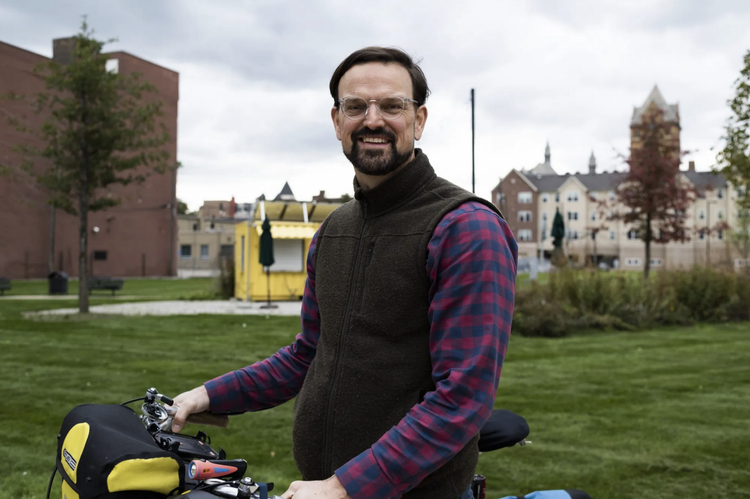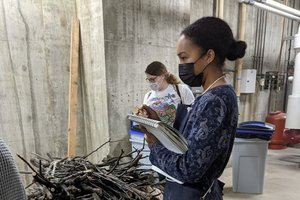Actionable Sustainability Initiatives for Businesses from Detroit’s First Director of Sustainability

Joel Howrani Heeres, Detroit’s former, first, sustainability director, shared his thoughts about tangible initiatives businesses can integrate to work toward a cleaner environment. In his role, Howrani Heeres provides strategic leadership, tactical guidance, and technical skills to drive triple bottom line (environment, equity, & economics) strategy and actions to help Detroiters improve their lives by creating a healthier, greener, more vibrant city for all. Under Howrani Heere’s leadership, the Office of Sustainability had over 6,800 interactions with Detroiters and fostered partnerships with neighborhoods, businesses, and philanthropic and non-governmental organizations working to make Detroit more equitable, economically thriving, and environmentally healthy. Before taking this position, Howrani Heeres led sustainability and climate action planning at EcoWorks and served as managing director of the Southeast Michigan Regional Energy Office for DTE Energy. We asked him to share some steps that businesses can take to reduce energy and water usage as well as ensure residents are not experiencing impacts from climate and climate change. Track energy and water usage You manage what you measure, so start measuring. Data shows that once you begin tracking usage you’ll begin saving 3% in energy costs. A good opportunity for businesses to begin measuring and reducing energy waste is to join the Detroit Energy Challenge. This was launched in collaboration with the Detroit 2030 District and Michigan Battle of the Buildings, and it’s a free and friendly competition. Conduct an energy audit Doing a walk-through with an expert to point out things that can be done to save energy is invaluable. Within the city, we’ve conducted these audits now on 155 buildings and identified conservation measures that we are implementing. There are several audit programs available, such as DTE’s Business Energy Consultation. Update lighting A low-hanging fruit initiative is to update to LED. The cost to do so is coming down, and the cost of electricity is rising, so this is a win/win. Integrate renewables Integrating renewable or solar energy is a great action to take, especially if the electrical load is high. Companies can get a 26% tax credit for investing in solar. Check out the Detroit Solar Toolkit to identify your building’s solar potential. Join the global Race to Zero campaign Race To Zero participants are committed to achieving net-zero carbon emissions by 2050 at the latest. The city of Detroit has joined the campaign. Race to Zero’s intent is to rally leadership and support from businesses, cities, regions, and investors for a healthy, resilient, zero-carbon recovery that prevents future threats, creates decent jobs, and unlocks inclusive, sustainable growth. Electrification To get to net zero we must also think about electrification. We know we can clean the grid and introduce renewables, but we cannot clean natural gas. When you consider the cost of maintenance, gas, and parts on a gas-run vehicle, the total cost of electric vehicle ownership makes sense economically as well as environmentally. DTE offers a Charging Forward rebate program, so it pays to be an early adopter. Make investments in climate resilience We all remember last year’s flood event, and climate projections tell us that we’ll continue to see more and more extreme storms. Installing things such as backflow preventers, sump pumps, and generators are great considerations. Engage with neighbors Being a good corporate citizen and good neighbor reaps great benefits. I think businesses should talk to their communities and ask what things would make the neighborhood better. Also, look around at the land you own. Plant trees. Invest in biodiversity. Interested in getting assistance in setting up a sustainability program? Howrani Heeres points to DTE as a resource and also B Corp certification, a designation that a business is meeting high standards of social and environmental performance. Be sure to subscribe to our newsletter for regular updates on sustainable business practices in and around Detroit.
The Wright – Committed to Preserving African American Culture – and the Environment

At their best, museums champion the exchange of ideas and the enrichment of intellect. As such, the Charles H. Wright Museum of African American History approaches sustainability within the context not only of preservation but also of education. The museum is at the forefront worldwide in its effort to make the work of sustainability visible in museums so that everyone can see that they have a stake in—and can contribute to—environmental preservation. The Wrights’ sustainability efforts formally took hold in 2015 upon hiring Leslie Tom, as its Chief Sustainability Officer who relocated from San Francisco by way of Arizona. Tom’s background in Architecture andInformation Management with a focus in the future of libraries, archives and museum domains were a perfect match for being the Third Cohort for a mid-career Detroit Revitalization Fellowship through Wayne State University. Of her role at The Wright, Tom says “To have the opportunity to combine my experience in environmental history and culture with the methodologies of service design and architecture and apply them at one of the oldest African American museums in the world is a dream job.” She goes on to say, The fact that the museum has a Sustainability Officer on staff illustrates its dedication and commitment to sustainability at all levels. Few museums even have this role. Under Tom’s leadership, The Wright has become a frontrunner in sustainability within the museum field. In 2019, The Wright was one of five museums to earn The Sustainability Excellence Award from the American Alliance of Museums Environment and Climate Network. Tom values the regional sustainability network and so helped to co-chair the inaugural Detroit 2030 District’s first Venue and Museums Committee. Detroit 2030 District is a part of a national movement to create high-performance building districts by reducing the environmental impacts of building. Tom points to three main areas of focus regarding the museums’ current sustainability efforts. “First is working to expand the triple bottom line [people, planet, prosperity and programs] and do what museums do well – engage learners,” she says. She gives d.Tree Studio as an example. When dying Zelkova trees were discovered on The Wright’s campus, instead of sending them to a landfill, the museum partnered with the College for Creative Studies to create d.Tree Studio – an ongoing wood shop class to explore connections between design, African American material culture/history, and sustainability. Students use the dying trees to make everything from a decolonized chess set to a fully-functioning record player. Second, is the Climate Action Framework, which The Wright museum supports through a green think tank team of museum staff, landscape architects, urban planners, designers, and community engagement plans all addressing the social and technical aspects of lowering the carbon footprint. Third, is the museum’s green work around the African World Festival. “We’ve been doing exciting green work since 2015 that’s finally being operationalized and next year will be line items in the budget,” she says. “This will include things like bike valets, recycling and compost space, sharing information at the festival and more.” She goes on to say, It’s been so satisfying to see co-creation and adoption by my colleagues and their inclinations increase toward a green institution. No one person can do it alone, and having mother nature break down silos, we’ve got support and work to do from the top down and bottom up. Some measurable initiatives The Wright has been involved with over the past several years include: The Wright’s proactive response to the August floods of 2014and increasing rain events created a collaboration with the Michigan Science Center where the result was a November 2019 convening calledRipple of Impact. Over 200 people visited our Green Stormwater Infrastructures to taste, touch, see, smell, feel the water. The Wright effectively manages nearly 19,000 gallons of stormwater each year removing 50,000 gallons of stormwater permanently from the sewer system overall. See the Stormwater Hub for more info. The Wright is continuing this work by hosting the Green Museum Town Hall with our Learning and Engagement and Sustainability Departments. Please check our website for our Green Museum Town Hall in mid-November 2022. In 2015, the museum installed Variable Fan Drives (VFDs) so museum pumps and motors do not run 24 hours per day, 7 days per week. From this effort, The Wright reduced its utility bill by $30,000. Due to green efforts around the African World Festival, The Wright has seen a 5% waste diversion rate increase, repurposed 536 pounds of recyclable material, and diverted 387 pounds of organics from landfills. A strong commitment to sustainability among The Wright’s staff has led to a 400% uptick in recycling rates on the museum campus. Of doing this work in Detroit, Tom says, “As an outsider coming into Detroit, I can say that I haven’t found another city where so much consideration and multi-generational collaboration is happening. Between the local organizations, nonprofits, and businesses the best practices coming out of Detroit are very impressive. To be working within this environment has true potential for addressing our climate crisis collectively.” When asked what project she’s most proud of, Tom says the investment made in 2019 to laser scan the entire museum building. “We now essentially have a digital twin of the building stored in the cloud, so that when we collaborate with landscape architects and engineers to invest in energy-efficient systems and more, we can upload the specs and leverage the data on how best to take care of this institution.” What’s next for The Wright? Tom says their continued work on creating a green museum of the future. “We are convening conversations and setting new standards. It’s an exciting place to be.” In closing, The Wright’s President and CEO, Neil Barclay says, “Inaction affects us all. So join The Wright as we transform spaces, hearts, and minds to make room for a more equitable future here in Detroit.” Be sure to subscribe to our newsletter for regular updates on sustainable business practices in and around Detroit.


